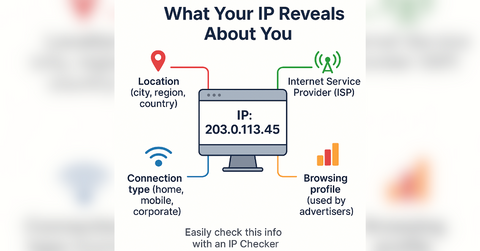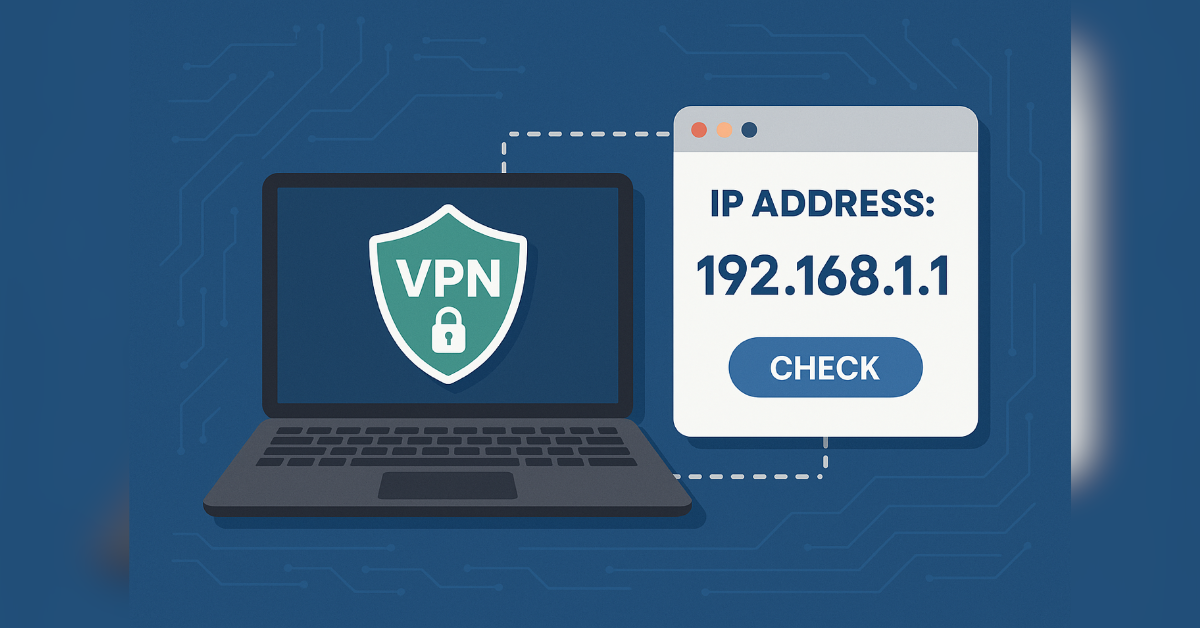 NEWS
NEWSHow to Check Your IP Address Right Now — And Why It’s the #1 Privacy Move in 2025

Aug. 28 2025, Published 1:31 a.m. ET
_____________________________________________________________________________________________________________________
Introduction
Every time you connect to the internet—whether it’s from your office desktop, your phone at the gym, or the family laptop on the couch—you leave behind a digital trail. The most obvious piece of that trail? Your IP address.
Think of it as the street address for your online life. Just like someone with your home address can figure out roughly where you live, your IP address can show where you’re logging in from, down to your city or region, along with which internet provider you’re using.
The problem is that your IP often gives away far more than you realize. In today’s world of rising cybercrime and AI-powered tracking, protecting that information has become one of the most important privacy moves you can make in 2025.
In this guide, we’ll explain what your IP really reveals, the risks of leaving it exposed, how to check it instantly with free tools, and why pairing that check with a VPN can help lock down your digital identity.
_____________________________________________________________________________________________________________________
What Is an IP Address?
An IP (Internet Protocol) address is a unique string of numbers your device gets every time it connects online. Just like your house needs an address so deliveries can reach you, your device needs an IP so websites, apps, and data can find their way back to you.
There are two main formats:
- IPv4: The older, most common version (looks like 192.168.1.1).
- IPv6: A newer, longer format created because the internet simply ran out of IPv4 addresses.
IPs can also be static (fixed and unchanging, often used by businesses) or dynamic (rotating periodically, which is what most home users have).
But here’s the important part: your IP isn’t just a harmless number. It can reveal:
- Your location (often down to the city).
- Your ISP and network.
- Insights into what you do online, especially when combined with browser “fingerprinting.”
In short, your IP isn’t just technical—it’s personal. And in the wrong hands, it can become a liability.
The Hidden Dangers of Exposing Your IP
You might be thinking: “So what if someone sees my IP?” The reality is that exposure can open the door to risks you’d rather avoid.
1. Cyberattacks
Hackers can use your IP as a direct entry point to launch denial-of-service (DDoS) attacks or attempt to break into your network. Gamers are particularly familiar with this problem—IP-based attacks are a common way to disrupt online matches.
2. Identity & Location Tracking
Since your IP ties you to a region and provider, it becomes another puzzle piece in building a profile of you. Advertisers, data brokers, and even government agencies can combine that data with your browsing habits to predict your interests, shopping behavior, or political leanings.
3. Geo-Blocking & Censorship
Streaming services, banking apps, or news sites often block or restrict access depending on your IP’s location. That’s why some videos on YouTube say “Not available in your country”. Travel abroad and you may suddenly lose access to accounts you rely on every day.
Recent cybersecurity reports suggest that around 70% of breaches involve exploiting identifiable network data, like IP addresses. That means every time your real IP is visible, you’re leaving a trail that can be tracked or abused.
The easiest way to see what your connection is revealing is by using a free IP address lookup tool. In seconds, you’ll know exactly what details are visible.

Want OK! each day? Sign up here!
_____________________________________________________________________________________________________________________
Why Even VPN Users Should Regularly Check Their IP
A VPN masks your IP, but that doesn’t mean you can set it and forget it. Regular checks are essential for peace of mind:
- VPN quality control: If you connect to a server in New York, your IP should say New York—not your actual hometown.
- Detect leaks: Even good VPNs can sometimes leak data through DNS, WebRTC, or IPv6, exposing your real details.
- Geo-location testing: If you’re using a VPN to unlock content, an IP check quickly confirms whether it’s working.
Here’s a real-world scenario: imagine you’re working in a London café and connect to a VPN server in New York. If you run a check and your IP still says “London,” your VPN isn’t doing its job.
In testing, we’ve seen IPv6 leaks appear on unsecured Wi-Fi networks even with a VPN enabled. That’s why running an occasional IP check isn’t paranoia—it’s smart digital hygiene.
_____________________________________________________________________________________________________________________
How VPNs Protect You
So how does a VPN actually protect you? In simple terms, it creates an encrypted tunnel between your device and the internet. Your traffic is routed through a private server, hiding your real IP and replacing it with one from your VPN provider.
Here are five everyday ways a VPN plus an IP checker can safeguard your online life:
- Public Wi-Fi safety: Airports, cafés, and hotels are hotspots for snooping. A VPN prevents hackers from seeing your activity.
- Streaming freedom: Want to keep up with your favorite US series while traveling? A VPN helps you bypass geo-blocks.
- Travel & censorship: In countries that restrict news or social apps, VPNs restore access.
- Safer online shopping: VPNs stop price discrimination and protect payment details.
- Everyday browsing: From avoiding intrusive ads to protecting your kids’ devices, VPNs give you more control.
Modern providers, such as those listed on the X-VPN website, offer thousands of servers worldwide, making it simple to mask your IP no matter where you are.
_____________________________________________________________________________________________________________________
Step-By-Step: How to Check Your IP and Lock It Down
Ready to see how exposed you really are? Here’s a quick four-step routine:
- Visit an IP checker tool.
- Note your details—it will show your IP, location, and ISP.
- Turn on your VPN and connect to a server in another city or country.
- Check again. Your IP should now display your VPN server’s location.
If it still shows your original IP, troubleshoot by disabling IPv6 or enabling your VPN’s “leak protection” features.
It takes less than five minutes but can prevent hours of privacy headaches. Think of it as checking that your front door is locked before going to bed—simple, quick, and worth it.
_____________________________________________________________________________________________________________________
The Future of Online Privacy
Looking ahead, IP protection will only become more critical. Here’s why:
- AI-driven surveillance: Algorithms can cross-match IP data with browsing history to build extremely detailed user profiles.
- Data brokers booming: The personal data market is expanding, and IP addresses remain one of the first identifiers collected.
- Regulations rising: Laws like GDPR in Europe and new privacy laws in the US highlight user rights, but they also put more responsibility on individuals to secure their data.
Experts predict that by the end of this decade, IP masking will be as common as antivirus software used to be. VPNs and IP checkers will shift from “nice extras” to everyday essentials.
_____________________________________________________________________________________________________________________
Conclusion
Your IP might look like just a random number string, but it’s actually your digital fingerprint. Leaving it exposed is like handing out your home address to strangers.
Whether it’s hackers looking for an easy target, advertisers hungry for tracking data, or governments monitoring activity, the risks are real—and rising.
By checking your IP regularly and using a VPN, you take back control of your online identity. Your location, data, and browsing habits stay in your hands—not someone else’s.


